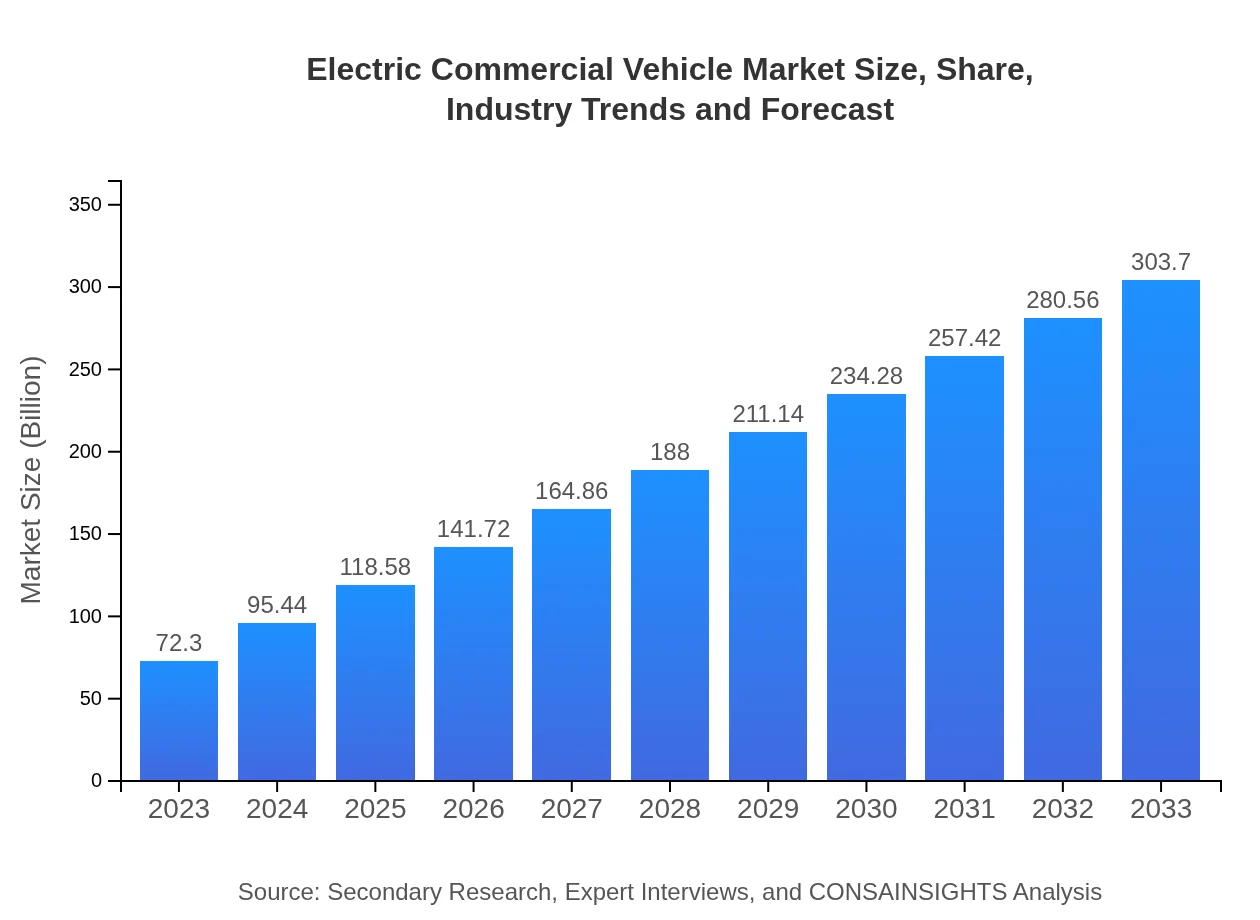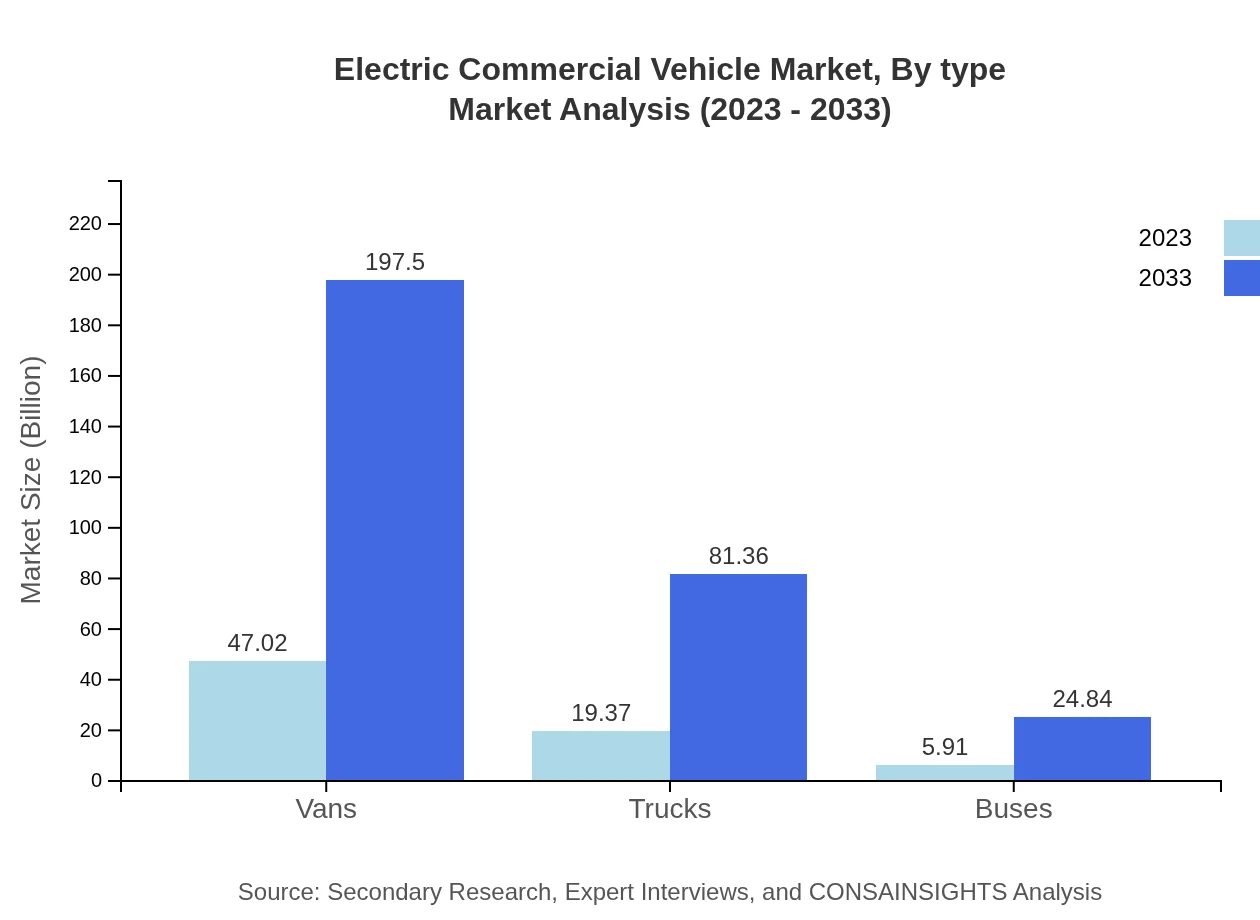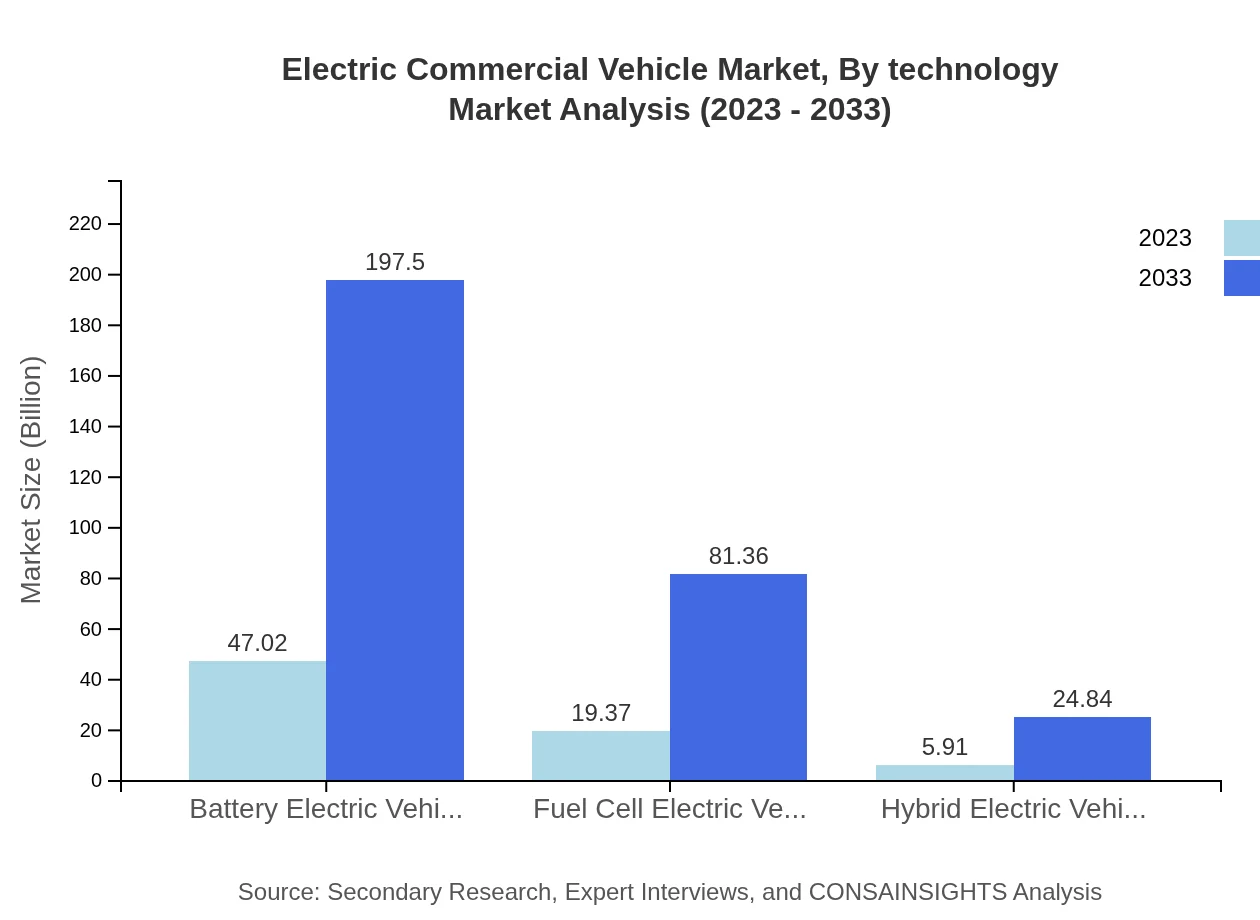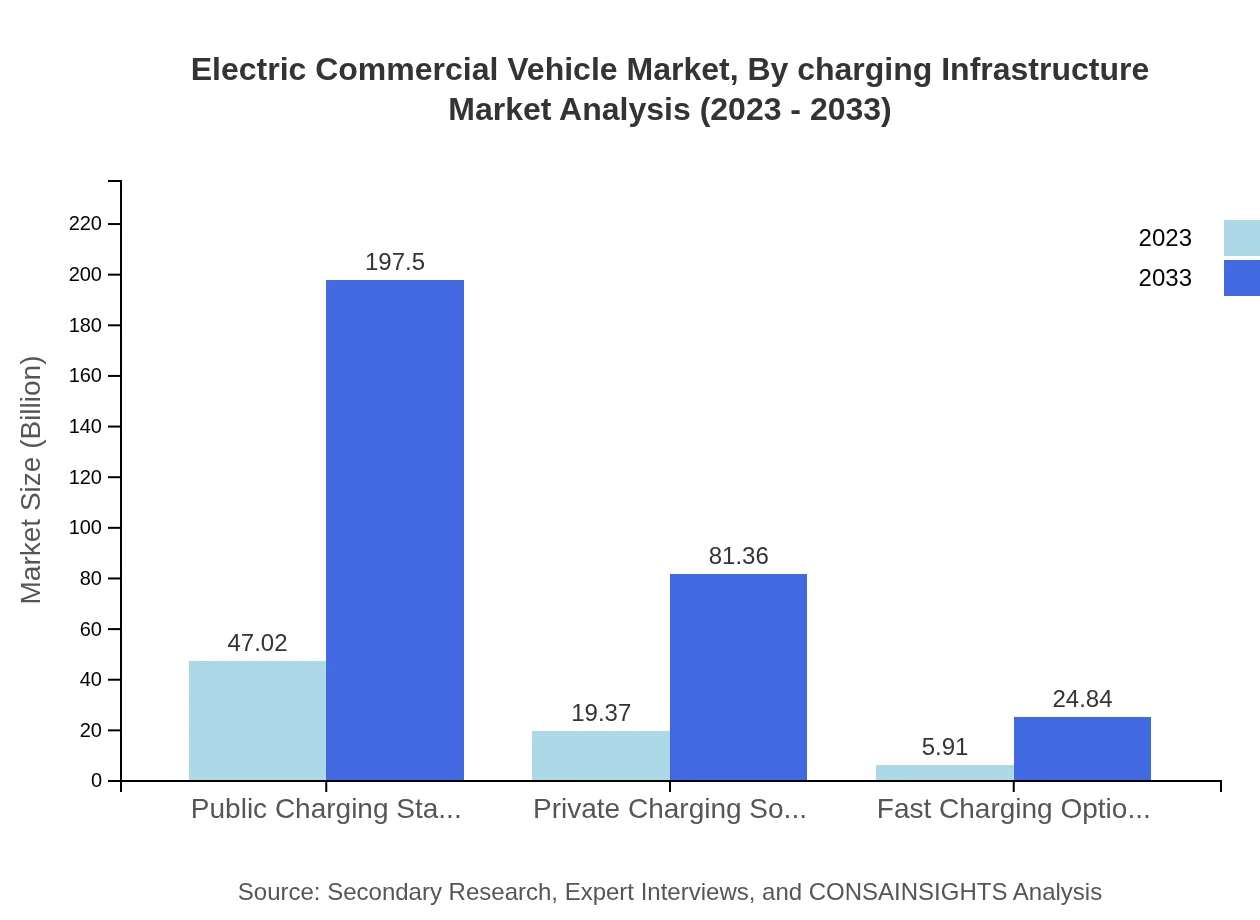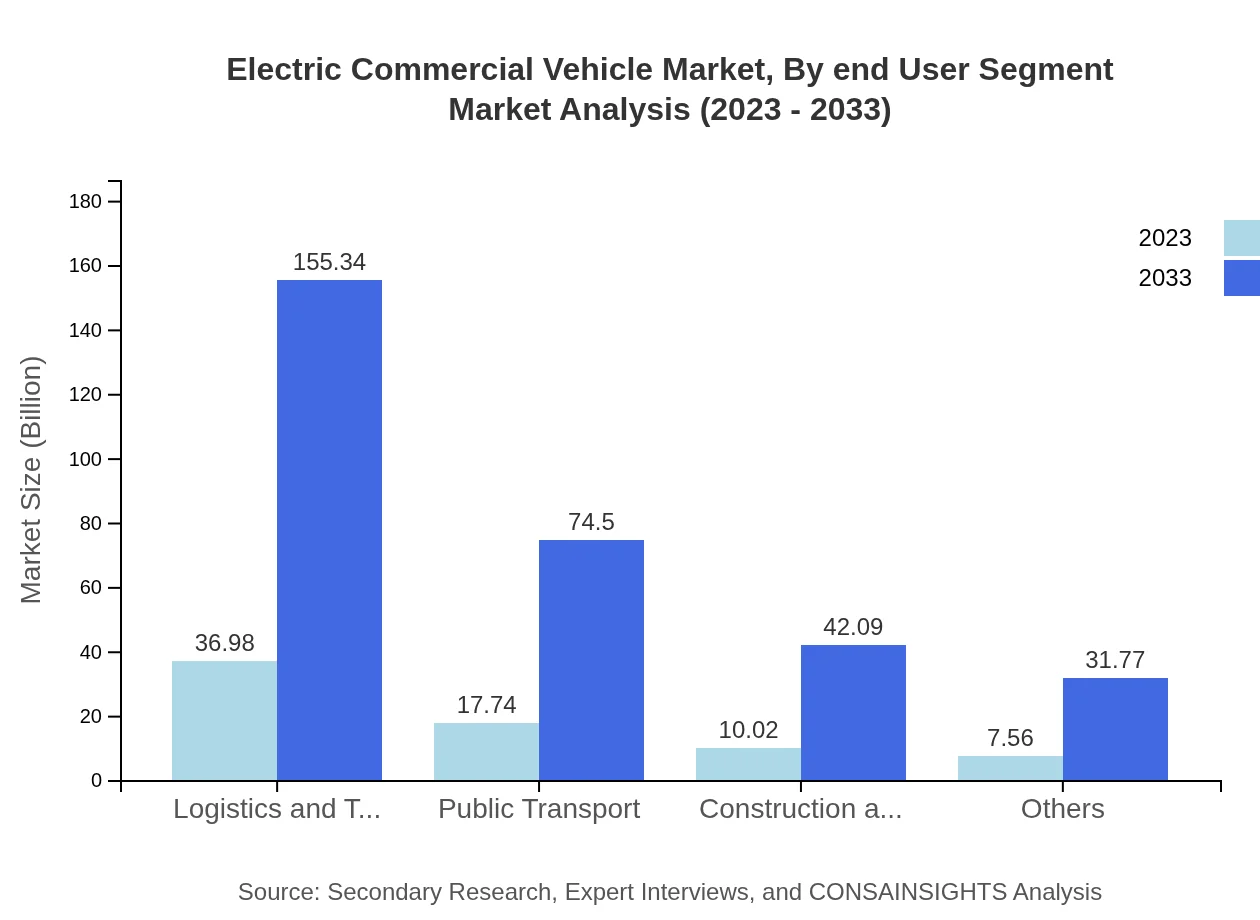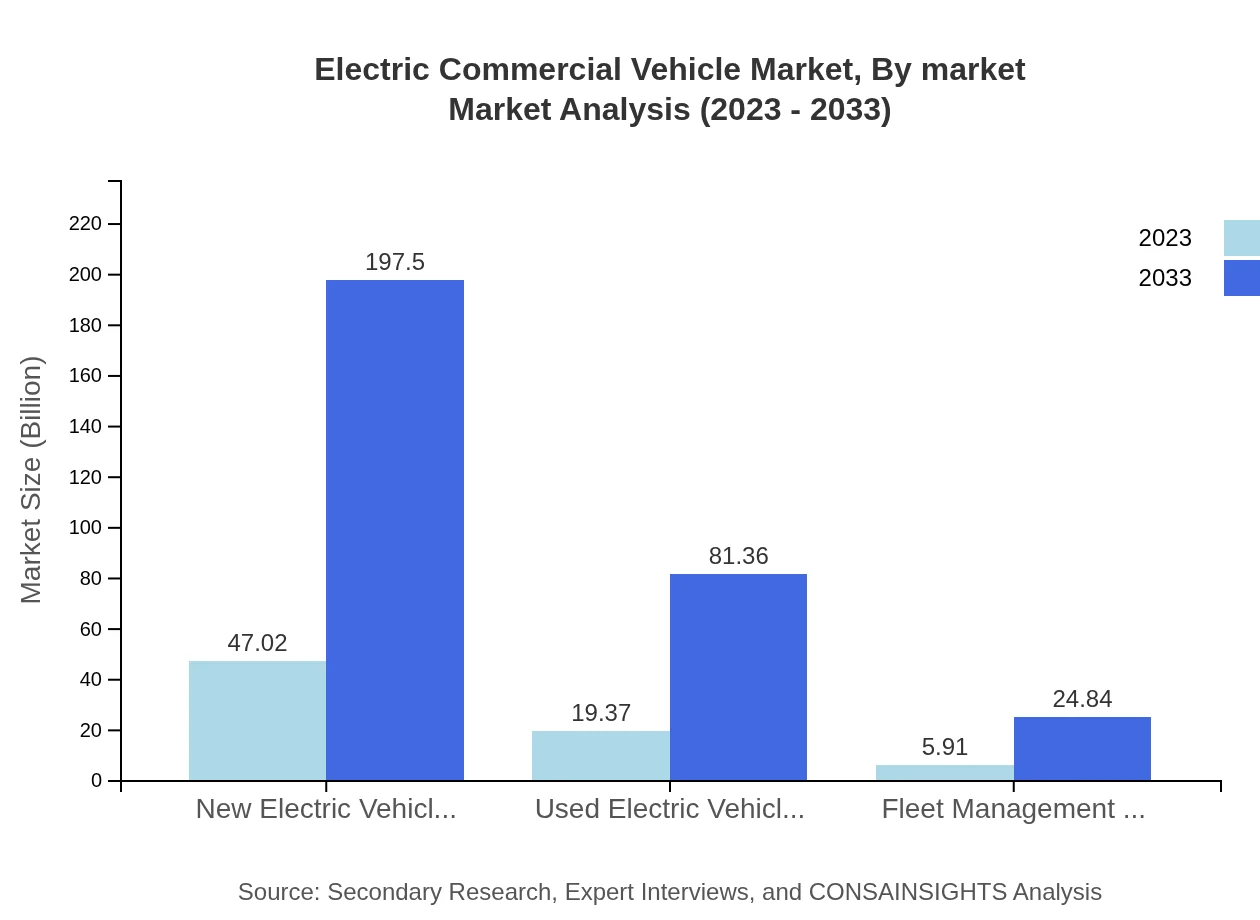Electric Commercial Vehicle Market Report
Published Date: 02 February 2026 | Report Code: electric-commercial-vehicle
Electric Commercial Vehicle Market Size, Share, Industry Trends and Forecast to 2033
This report provides a comprehensive analysis of the Electric Commercial Vehicle market, highlighting market dynamics, trends, and forecasts from 2023 to 2033. It covers market size, segmentation, regional insights, and key players shaping the industry.
| Metric | Value |
|---|---|
| Study Period | 2023 - 2033 |
| 2023 Market Size | $72.30 Billion |
| CAGR (2023-2033) | 14.7% |
| 2033 Market Size | $303.70 Billion |
| Top Companies | Tesla, Inc., BYD Auto Co., Ltd., Daimler AG, Volvo Group, Rivian Automotive, Inc. |
| Last Modified Date | 02 February 2026 |
Electric Commercial Vehicle Market Overview
Customize Electric Commercial Vehicle Market Report market research report
- ✔ Get in-depth analysis of Electric Commercial Vehicle market size, growth, and forecasts.
- ✔ Understand Electric Commercial Vehicle's regional dynamics and industry-specific trends.
- ✔ Identify potential applications, end-user demand, and growth segments in Electric Commercial Vehicle
What is the Market Size & CAGR of Electric Commercial Vehicle market in 2023?
Electric Commercial Vehicle Industry Analysis
Electric Commercial Vehicle Market Segmentation and Scope
Tell us your focus area and get a customized research report.
Electric Commercial Vehicle Market Analysis Report by Region
Europe Electric Commercial Vehicle Market Report:
Europe continues to spearhead the Electric Commercial Vehicle market, with a valuation of USD 20.65 billion in 2023, projected to grow to USD 86.74 billion by 2033. The European Union’s stringent regulations on vehicle emissions and ambitious goals for carbon neutrality are catalyzing the shift towards electric vehicles. The presence of key manufacturers and the encouragement of public-private partnerships for charging infrastructure development bolster the market scope.Asia Pacific Electric Commercial Vehicle Market Report:
In the Asia-Pacific region, the Electric Commercial Vehicle market was valued at USD 13.86 billion in 2023 and is projected to rise to USD 58.22 billion by 2033. The rapid urbanization, combined with government initiatives to promote electric mobility and stringent emissions regulations, is expected to foster significant market growth. Leading economies like China and Japan are investing heavily in electric vehicles, and the presence of major manufacturers further enhances market dynamics.North America Electric Commercial Vehicle Market Report:
North America’s Electric Commercial Vehicle market, estimated at USD 26.91 billion in 2023, is anticipated to soar to USD 113.04 billion by 2033. The U.S. and Canada lead the market, supported by federal incentives for electric vehicle purchases and advancements in charging infrastructure. The growing emphasis on reducing greenhouse gas emissions and improving air quality further drives the adoption of electric vehicles in the commercial sector.South America Electric Commercial Vehicle Market Report:
The South American market is positioned for growth, with a market size of USD 5.92 billion in 2023, forecasted to grow to USD 24.87 billion by 2033. While infrastructure development remains a challenge, recent governmental policies supporting the adoption of electric vehicles are likely to stimulate market participation. Awareness of environmental issues is growing, leading to increased demand for commercial applications of electric vehicles.Middle East & Africa Electric Commercial Vehicle Market Report:
In the Middle East and Africa, the Electric Commercial Vehicle market is estimated at USD 4.96 billion in 2023, with expectations to grow to USD 20.83 billion by 2033. The region is increasingly investing in renewable energy sources and electric mobility solutions, albeit at a slower pace compared to other regions. Emerging economies in Africa are beginning to adopt electric buses and commercial vehicles to improve urban mobility and reduce pollution.Tell us your focus area and get a customized research report.
Electric Commercial Vehicle Market Analysis By Type
The market by type includes Vans, Trucks, and Buses. In 2023, vans dominate the market with a size of USD 47.02 billion, expected to rise to USD 197.50 billion by 2033. Trucks, with a market size of USD 19.37 billion in 2023, are projected to grow to USD 81.36 billion. Buses, though smaller, are projected to expand from USD 5.91 billion to USD 24.84 billion within the same timeframe. The increase in logistics demand, delivery services, and public transportation modernization drives the overall market.
Electric Commercial Vehicle Market Analysis By Technology
Electric Commercial Vehicles primarily comprise Battery Electric Vehicles (BEVs), Fuel Cell Electric Vehicles (FCEVs), and Hybrid Electric Vehicles (HEVs). As of 2023, BEVs lead the market with a size of USD 47.02 billion, forecasted to reach USD 197.50 billion by 2033. FCEVs hold a significant market presence at USD 19.37 billion, expecting growth to USD 81.36 billion by 2033. HEVs, accounting for USD 5.91 billion in 2023, are anticipated to grow to USD 24.84 billion, with consumer preference shifting towards more sustainable options across commercial sectors.
Electric Commercial Vehicle Market Analysis By Charging Infrastructure
The charging infrastructure market for Electric Commercial Vehicles encompasses public charging stations, private charging solutions, and fast charging options. Public charging stations led the market with a size of USD 47.02 billion in 2023, projected to rise to USD 197.50 billion by 2033. Private charging solutions are also crucial, with market values anticipated to increase from USD 19.37 billion to USD 81.36 billion during the same period. Fast charging options, while having a smaller share, are expected to see growth from USD 5.91 billion to USD 24.84 billion, driven by the urgency for efficient charging solutions.
Electric Commercial Vehicle Market Analysis By End User Segment
Key end-user segments in the Electric Commercial Vehicle market include logistics and transportation, public transport, and construction/heavy equipment. The logistics and transportation segment holds the largest share, with a size of USD 36.98 billion in 2023, growing to USD 155.34 billion by 2033. Public transport is a significant contributor, expanding from USD 17.74 billion to USD 74.50 billion. The construction segment, while smaller, is projected to grow from USD 10.02 billion to USD 42.09 billion, reflecting the industry's gradual transition towards electrification.
Electric Commercial Vehicle Market Analysis By Market
The market is diversifying with various trends catering to different segments. The new electric vehicle sales dominate the market with USD 47.02 billion in 2023, forecasted to soar to USD 197.50 billion by 2033. Used electric vehicle sales are notable, increasing from USD 19.37 billion to USD 81.36 billion, as consumers explore cost-effective options. Fleet management solutions represent an evolving segment, rising from USD 5.91 billion to USD 24.84 billion, as companies seek efficiency and sustainability in operations.
Electric Commercial Vehicle Market Trends and Future Forecast
Tell us your focus area and get a customized research report.
Global Market Leaders and Top Companies in Electric Commercial Vehicle Industry
Tesla, Inc.:
Tesla is a leader in electric vehicle innovation and production, offering electric trucks and vans designed for commercial applications. They focus on technology, efficiency, and sustainability.BYD Auto Co., Ltd.:
A major Chinese manufacturer, BYD specializes in electric vehicles, with a strong presence in electric buses and logistics solutions, catering to domestic and international markets.Daimler AG:
Daimler produces electric trucks and vans, prioritizing developing a comprehensive electric vehicle ecosystem. Their offerings include the eActros and eSprinter, targeting commercial sectors.Volvo Group:
Volvo focuses on sustainable transport solutions, providing electric trucks and buses, aiming for improved urban mobility and environmental responsibility in logistics.Rivian Automotive, Inc.:
Rivian is emerging with a focus on electric delivery vans, having partnered with Amazon for a large-scale order, redefining delivery services with sustainable options.We're grateful to work with incredible clients.









FAQs
What is the market size of electric Commercial Vehicle?
The global electric commercial vehicle market is valued at approximately $72.3 billion in 2023, with a compound annual growth rate (CAGR) of 14.7%. By 2033, the market is expected to significantly expand as electrification in transport accelerates.
What are the key market players or companies in this electric Commercial Vehicle industry?
Key players in the electric commercial vehicle market include established automotive companies such as Tesla, Daimler, and Volvo, as well as new entrants focused on electric mobility solutions. These companies are innovating and competing to capture market share.
What are the primary factors driving the growth in the electric commercial vehicle industry?
The growth of the electric commercial vehicle industry is driven by factors such as advancements in battery technology, stringent environmental regulations, the push for sustainable transport solutions, and increased investment in electric infrastructure.
Which region is the fastest Growing in the electric commercial vehicle market?
North America is projected to be the fastest-growing region in the electric commercial vehicle market, expected to grow from $26.91 billion in 2023 to $113.04 billion by 2033. This reflects a surge in electric vehicle adoption and infrastructure development.
Does ConsaInsights provide customized market report data for the electric commercial vehicle industry?
Yes, ConsaInsights offers customized market report data tailored to specific needs within the electric commercial vehicle industry. Clients can request insights that address their unique market challenges and opportunities.
What deliverables can I expect from this electric commercial vehicle market research project?
From this market research project, you can expect comprehensive reports including market size data, growth forecasts, competitive analysis, trend insights, and regional breakdowns of the electric commercial vehicle market.
What are the market trends of electric commercial vehicle?
Current market trends in the electric commercial vehicle segment include increased electrification of fleets, integration of smart technologies, the rise of battery management systems, and a move towards sustainable logistics and public transport solutions.

